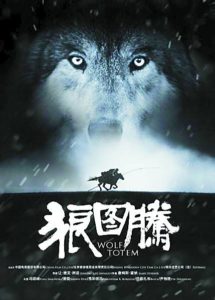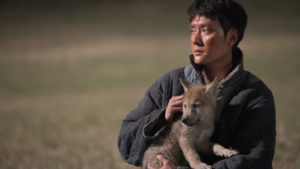 Wolf Totem is based on one of my favorite books of the last decade, so it had a lot to live up to. Sadly, it didn’t. I saw it on a small screen though, and could tell that on a big screen (or even better, the IMAX version) the landscape would be a powerful element in the story, perhaps even making up for some of the narrative deficiencies in the adaptation. The book is a semi-autobiography of Chen Zhen, a young Chinese college student during the Cultural Revolution, who is sent out to Inner Mongolia with one of his friends to civilize the nomads. He grows to respect the indigenous people, their way of life, and particularly the wolves. It is a tale of the massive environmental and cultural damage done by the Han Chinese in their misguided conquest of the Mongolian grasslands. As adapted and directed by Jean-Jacques Annaud (Quest for Fire, Seven Years in Tibet) though, the story is more about the wolves as fierce killers than as part of the life cycle of the place.
Wolf Totem is based on one of my favorite books of the last decade, so it had a lot to live up to. Sadly, it didn’t. I saw it on a small screen though, and could tell that on a big screen (or even better, the IMAX version) the landscape would be a powerful element in the story, perhaps even making up for some of the narrative deficiencies in the adaptation. The book is a semi-autobiography of Chen Zhen, a young Chinese college student during the Cultural Revolution, who is sent out to Inner Mongolia with one of his friends to civilize the nomads. He grows to respect the indigenous people, their way of life, and particularly the wolves. It is a tale of the massive environmental and cultural damage done by the Han Chinese in their misguided conquest of the Mongolian grasslands. As adapted and directed by Jean-Jacques Annaud (Quest for Fire, Seven Years in Tibet) though, the story is more about the wolves as fierce killers than as part of the life cycle of the place.
In the film Chen Zhen is but a pawn in the Maoist plan to bring the nomads under the Chinese government’s control. He is there to teach them to read and speak Mandarin, but he is quickly taken by the beauty of the land and their pastoral way of life.  There is an officious Chinese handler who shows up from time to time to direct the locals to do things they know not to do, since they have lived in harmony with nature and its cycles for centuries. He wants them to kill all the wolves, starting with their pups. (Though not terribly graphic, animal lovers will definitely not enjoy this part of the film.) Chen Zhen secretly adopts one of the pups to study, he claims, which eventually gets him in trouble from both groups. The official also wants to make the nomads settle in permanent villages that destroy pristine grasslands forever, and he’s big on killing any animal out there that moves, which the nomads know keep the grasslands fertile and capable of sustaining life. I’m not sure if Annaud tempered the character of this official because it is a Chinese co-production, but the lesson of the book for me was that the “civilized” people were entirely ignorant of and indifferent to the delicate balance between men and the natural world that the “natives” knew all too well. And that the smart college student who came to teach them was the one who learned the lesson.
There is an officious Chinese handler who shows up from time to time to direct the locals to do things they know not to do, since they have lived in harmony with nature and its cycles for centuries. He wants them to kill all the wolves, starting with their pups. (Though not terribly graphic, animal lovers will definitely not enjoy this part of the film.) Chen Zhen secretly adopts one of the pups to study, he claims, which eventually gets him in trouble from both groups. The official also wants to make the nomads settle in permanent villages that destroy pristine grasslands forever, and he’s big on killing any animal out there that moves, which the nomads know keep the grasslands fertile and capable of sustaining life. I’m not sure if Annaud tempered the character of this official because it is a Chinese co-production, but the lesson of the book for me was that the “civilized” people were entirely ignorant of and indifferent to the delicate balance between men and the natural world that the “natives” knew all too well. And that the smart college student who came to teach them was the one who learned the lesson.
I’m sure my love for the book and for wolves and their place in nature colors my view of this adaptation. But I think there was a much better film that could have come from it. It is quite beautifully shot, but the characters were more distinctive in the book, and story-wise it leaves a lot to be desired for this viewer. Don’t run out to see it, unless you just want to see some pretty pictures. I do, however, highly recommend you read the book.
